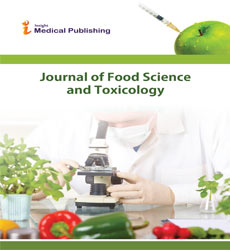Biotechnology in the Field of Food: Importance and Applications
Saritha Iyer*
Department of Food and Nutrition, Samatha Institue of Technology and Sciences, Meerut, Uttar Pradesh, India
- *Corresponding Author:
- Saritha Iyer
Department of Food and Nutrition, Samatha Institue of Technology and Sciences, Meerut, Uttar Pradesh India
Tel: 74125896330
E-mail: Saritha.iyer@rediifmail.com
Received Date: December 03, 2021; Accepted Date: December 17, 2021; Published Date: December 24, 2021
Citation: Iyer S (2021) Biotechnology in the Field of Food: Importance and Applications. J Food Sci Toxicoles Vol.5 No.4
Commentary
Biotechnology deals with the genes and their expression on an organism. For every physical or structural character of an organism, gene is very much necessary. Using these principles scientists started to study the gene and the codons. Using this technology one can create an ideal genetic sequence which codes for desirable genes. For example if a fruit has great taste but not size and the same fruit of different tree has good size but no taste, using biotechnology one can produce a new gene taking the desirable characters of both fruits, the genetic material produced this way is known as Recombinant DNA. This technology can be applied to all the food that we consume.
The advantages of biotechnology are
• This results in the production of higher yields which is beneficial.
• Disease resistant, drought-resistant plants can be produced; this results in gain of expected yield.
• The nutrition value of the food can also be increased and the freshness of the food can also be maintained.
• As the plants become disease-resistant, there will be less pesticide usage, hence reducing the chemical contents in food.
• Undesirable characters such as unwanted patches, seeds, less size, irregular shape can be eliminated and the best food can be produced.
• The will be increase in the economy and less loss of food.
• Time required for the outcome of yield is also reduced and higher yields are produced from the same area of the land.
• These methods are economical and beneficial to both producers and consumers.
• In many nations food biotechnology has hugely helped to fight hunger and malnutrition.
• The farmers are also greatly benefited by the biotechnological methods.
• The availability of seasonal fruits and vegetables can also be increased.
The organisms produced by this technology are called Genetically Modified Organisms (GMO). Many vegetables and fruits are genetically modified; they are cotton, soya bean, potatoes, papaya, grapes, brinjal and apple. In the early ages, it was practiced by cross breeding the plants to get the ideal characters in them. These GMOs are designed in such a way that they are sustainable to all the conditions. The foods produced by this technology are labeled as GMOs. The safety of consuming them is first totally tested by the scientists and then it is to be approved by the institutes like FDA, WHO that they are safe for human intake.
Biotechnology has been very useful in many cases but in case of food it has been a game changer because since then the countries started developing these biotechnologically modified crops, this helped us to meet the demand of food which would be totally impossible without the field of biotechnology as the population of the world has been gradually increasing and the agricultural lands were reducing and sometimes the famines have also resulted because of this reason. These organisms can produce the proper fruit in any type of drastically conditions. Food biotechnology has pulled the whole world from the stage of hunger and famine to a nutritious and prosperous pace.
Open Access Journals
- Aquaculture & Veterinary Science
- Chemistry & Chemical Sciences
- Clinical Sciences
- Engineering
- General Science
- Genetics & Molecular Biology
- Health Care & Nursing
- Immunology & Microbiology
- Materials Science
- Mathematics & Physics
- Medical Sciences
- Neurology & Psychiatry
- Oncology & Cancer Science
- Pharmaceutical Sciences
